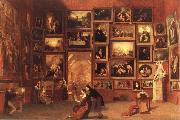Wholesale Oil Painting Reproductions No Minimum and Door to Door! |
|||||||||||
|
|
|||||||||||

|
|||||||||||
|
|
|
||||||||
All Samuel FB Morse Oil Paintings |
||||||||
|
|
||||||||
|
|
||||||||
|
Artist Introduction: 1791-1872,American painter and inventor. The son of a Calvinist minister, he began amateur sketching while a student at Yale College, New Haven, CT. After graduating in 1810, he returned to Charlestown, MA, to paint family portraits. In Boston in the same year he met Washington Allston, recently returned from Italy, under whose tutelage he executed his first history painting, the Landing of the Pilgrims at Plymouth (c. 1810-11; Boston, MA, Pub. Lib.). He joined Allston on his trip to London in 1811, enrolled in the Royal Academy Schools and also studied privately with Allston and Benjamin West. Morse Dying Hercules (1812-13; New Haven, CT, Yale U. A.G.), based on the pose and musculature of the Laokoon (Rome, Vatican, Mus. Pio-Clementino) and the theory evident in Allston Dead Man Restored to Life by Touching the Bones of the Prophet Elisha (1811-14; Philadelphia, PA Acad. F.A.), was critically acclaimed when exhibited at the Royal Academy and is indicative of Morse academic interests. After two trips in 1813 and 1814 to Bristol, where he painted a number of portraits and small subject pieces, Morse ended his period in England with another mythological history painting, the Judgement of Jupiter (1814-15; New Haven, CT, Yale U. A.G.). |
||||||||
|
|
||||||||
|
Gallery of the Louvre Painting ID:: 50494 |
mk212
1831-3
Oil on canvas
187.3x274.3cm
|
|||||||
Height Width |
INS/CM Quality |
|||||||
|
CONTACT US |

